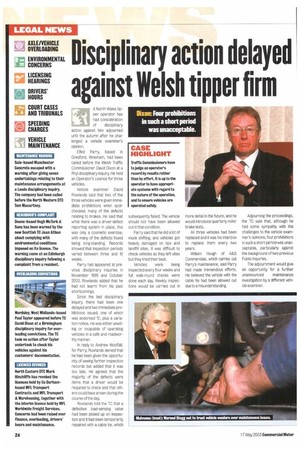Disciplinary action delayed against Welsh tipper firm
Page 24

If you've noticed an error in this article please click here to report it so we can fix it.
A North Wales tipper operator has had consideration of disciplinary action against him adjourned until the autumn after he challenged a vehicle examiner's opinion.
Elfed Parry, based in Gresford, Wrexham, had been called before the Welsh Traffic Commissioner David Dixon at a Rhyl disciplinary inquiry. He held an Operator's Licence for three vehicles.
Vehicle examiner David Rowlands said that two of the three vehicles were given immediate prohibitions when spotchecked, many of the defects relating to brakes. He said that while there was a driver-defect reporting system in place, this was only a cosmetic exercise, with many of the defects found being long-standing. Records showed that inspection periods varied between three and 10 weeks.
Parry had appeared at pre0:ius disciplinary inquiries in November 1999 and October 2000. Rowlands added that he had net learnt from his past shortcomings.
Since the last disciplinary inquiry, there had been one delayed and two immediate prohibitions issued, one of which was endorsed '3', plus a variation notice. He was either unwilling or incapable of operating vehicles in a safe and roadworthy manner.
In reply to Andrew Woo!fall, for Parry, Rowlands denied that he had been given the opportunity of seeing further inspection records but added that it was too late. He agreed that the majority of the defects were items that a driver would be required to check and that others could have arisen during the course of the day Rowlands told the TC that a defective load-sensing valve had been picked up on inspection and it had been temporarily repaired with a cable tie, which subsequently failed. The vehicle should not have been allowed out in that condition.
Parry said that he did a lot of muck shifting, and vehicles got heavily damaged on tips and landfill sites. It was difficult to check vehicles as they left sites but they tried their best.
Vehicles were being inspected every four weeks and full walk-round checks were done each day. Weekly inspections would be carried out in more detail in the future, and he would introduce quarterly roller brake tests.
All three vehicles had been replaced and it was his intention to replace them every two years.
William Hough of A&S Commercials, which carries out Parry's maintenance, said Parry had made tremendous efforts. He believed the vehicle with the cable he had been allowed out due to a misunderstanding. Adjourning the proceedings, the TC said that, although he had some sympathy with the challenges to the vehicle examiner's opinions, four prohibitions in such a short period was unacceptable, particularly against the background of two previous Public Inquiries.
The adjournment would give an opportunity for a further unannounced maintenance investigation by a different vehicle examiner.
































































































































































